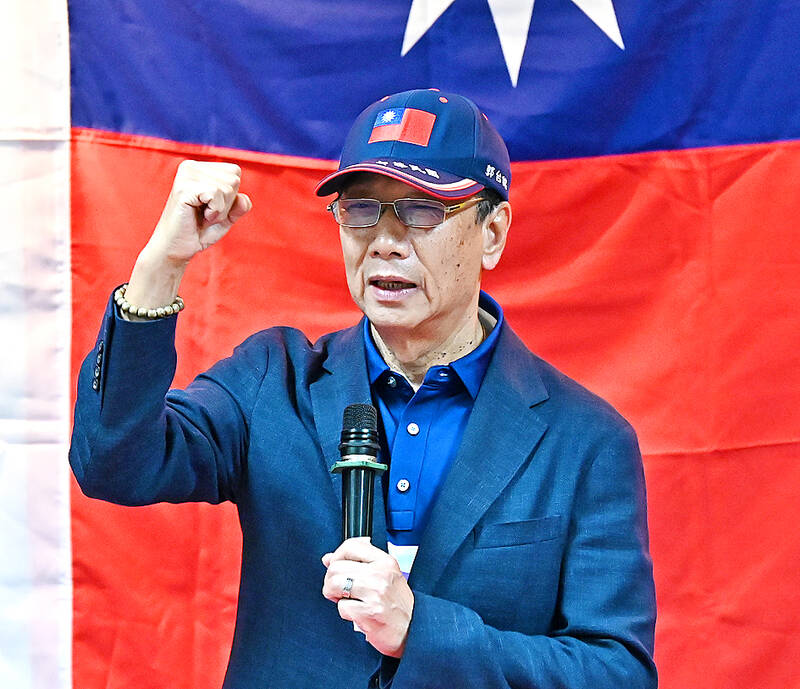Hon Hai Precision Industry Co founder Terry Gou (郭台銘) yesterday apologized for saying that small modular nuclear reactors (SMRs) should be built in Kaohsiung.
Gou is vying for the Chinese Nationalist Party (KMT) nomination for next year’s presidential election.
Asked about his views on green power during a speech on Monday, Gou said establishing SMRs near Banpingshan (半屏山) in Kaohsiung would be “the right move” and is guaranteed to make money, adding that the government should take the lead in making the investment.

Photo: Lee Hui-chou, Taipei Times
The remarks caused a stir, with Citizen of the Earth, Taiwan saying that research into SMR technology worldwide is incomplete, adding that even if Taiwan wished to develop such technology, there is no mature predecessor for reference.
“We hope that Mr Gou will spend more time finalizing his energy policy platforms before commenting, or he might risk propagating untrue information,” the group said.
Later on Monday evening, Gou said on Facebook that he meant to highlight that Taiwan’s power provision capabilities were unstable and often fell short of actual usage.
He added that this would, inevitably, impact industry as it transitions toward a more sustainable model of production.
Gou said he was perhaps too brash in his haste to highlight the issue, but he also believes that at this juncture, nuclear power is among the options that need to be taken into account when considering the nation’s energy policy.
He said his team would present a transparent energy policy, adding that he understands that the decision for any public policy must consider multiple facets.
Gou also apologized for saying that he hopes to run the government like a corporation.
“We will not need the legislature to provide oversight; we will do it ourselves,” he said earlier.
Legislative oversight is an immutable part of the democratic process and should not be challenged or destroyed, Gou said on Monday, calling on people to understand what he meant instead of just listening to his words.
Gou also said he would use robots to defend Taiwan from the Chinese People’s Liberation Army and hopes to begin the production of the robots within three years.
Democratic Progressive Party Legislator Su Chiao-hui (蘇巧慧) yesterday called Gou a “failed presidential candidate.”
“That was basically an attempt by Gou to cover up his ridiculous remarks by brushing them off as a gaffe,” Su said.
Additional reporting by Wang Jung-hsiang

‘DENIAL DEFENSE’: The US would increase its military presence with uncrewed ships, and submarines, while boosting defense in the Indo-Pacific, a Pete Hegseth memo said The US is reorienting its military strategy to focus primarily on deterring a potential Chinese invasion of Taiwan, a memo signed by US Secretary of Defense Pete Hegseth showed. The memo also called on Taiwan to increase its defense spending. The document, known as the “Interim National Defense Strategic Guidance,” was distributed this month and detailed the national defense plans of US President Donald Trump’s administration, an article in the Washington Post said on Saturday. It outlines how the US can prepare for a potential war with China and defend itself from threats in the “near abroad,” including Greenland and the Panama

A wild live dugong was found in Taiwan for the first time in 88 years, after it was accidentally caught by a fisher’s net on Tuesday in Yilan County’s Fenniaolin (粉鳥林). This is the first sighting of the species in Taiwan since 1937, having already been considered “extinct” in the country and considered as “vulnerable” by the International Union for Conservation of Nature. A fisher surnamed Chen (陳) went to Fenniaolin to collect the fish in his netting, but instead caught a 3m long, 500kg dugong. The fisher released the animal back into the wild, not realizing it was an endangered species at

The High Prosecutors’ Office yesterday withdrew an appeal against the acquittal of a former bank manager 22 years after his death, marking Taiwan’s first instance of prosecutors rendering posthumous justice to a wrongfully convicted defendant. Chu Ching-en (諸慶恩) — formerly a manager at the Taipei branch of BNP Paribas — was in 1999 accused by Weng Mao-chung (翁茂鍾), then-president of Chia Her Industrial Co, of forging a request for a fixed deposit of US$10 million by I-Hwa Industrial Co, a subsidiary of Chia Her, which was used as collateral. Chu was ruled not guilty in the first trial, but was found guilty

The Chinese Nationalist Party (KMT) is maintaining close ties with Beijing, the Democratic Progressive Party (DPP) said yesterday, hours after a new round of Chinese military drills in the Taiwan Strait began. Political parties in a democracy have a responsibility to be loyal to the nation and defend its sovereignty, DPP spokesman Justin Wu (吳崢) told a news conference in Taipei. His comments came hours after Beijing announced via Chinese state media that the Chinese People’s Liberation Army’s Eastern Theater Command was holding large-scale drills simulating a multi-pronged attack on Taiwan. Contrary to the KMT’s claims that it is staunchly anti-communist, KMT Deputy